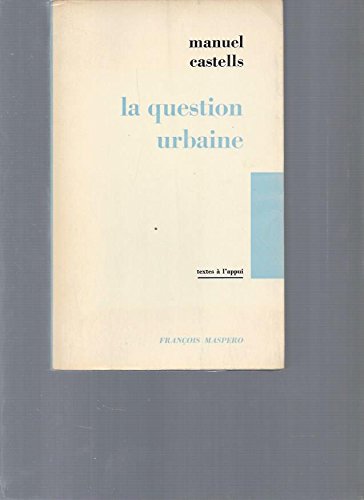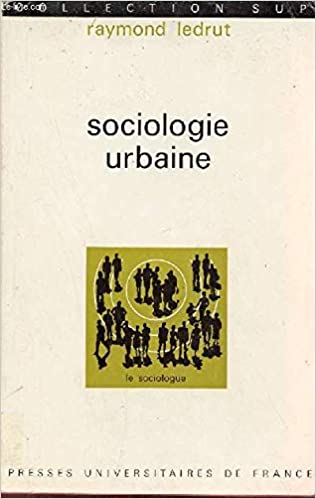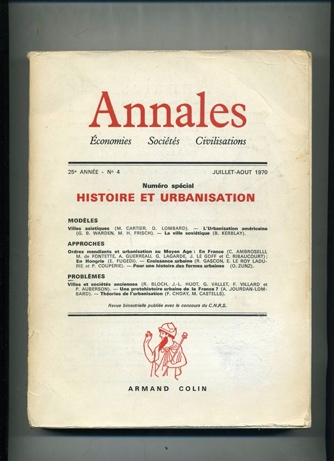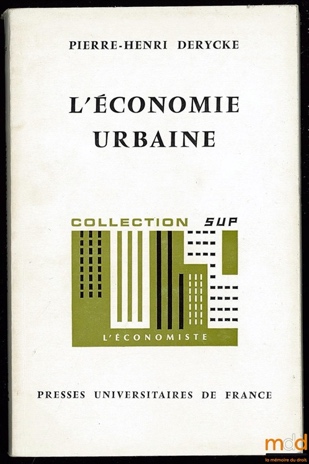From Urbanism to Territory
Part 2 of Chapter 2 sees the CERFI group working through texts by Marx on the opposition between the town/city and the country and identifying the model for this opposition in the ‘early’ work (The German Ideology) as town = civilization/country = barbarism; the town is thus proposed as the ‘Subject’ or ‘motor’ of history. CERFI want to question and critique this model; they show that it persists in the later work (Kapital) but that Marx also abandons the town as a focus or interest, in favour of a stress on the ‘system’. They look closely at Lefebvre’s La Pensée marxiste et la ville to criticise the way Lefebvre also seems to ‘subjectify’ the city as a pure (‘contentless’) motor of history. This ‘aporia’, they say in a footnote, determines the sociology of urbanism in its entirety, referring to Raymond Ledrut, Sociologie urbaine (PUF, 1968), Pierre-Henri Derycke, L’économie urbaine (PUF, 1970) and an Annales issue, ‘Histoire et urbanisation’ from July-August 1970. They are a little more charitable to Manuel Castells (who had taken up a post at the Ecole des Hautes études en sciences sociales in 1970) whose first book, La Question urbaine, was published by the leftist publisher Maspero in 1972, and which CERFI refer to as ‘une véritable somme’. Despite suggesting that Castells was ‘formed’ with Marx and Althusser, like them, they are critical of Castells’ recourse to the ‘unscientific’ concept of ‘expression’ – the city as the expression of a social structure -, adding that Althusser’s reconfiguration of Marxist concepts seemed to be disallowing any engagement with the specificity of the problem. The city/town is thus progressively evacuated as a working concept or problematic, and shifted towards that of ‘territory’ (via reference to [[ Lucien Febvre ]] and Fernand Braudel, both of the Annales school – though Febvre is an earlier presence).




CERFI thus recognise the ‘impasse’ into which they have got themselves: they are stuck with the city/country model, which is confined within the space of representation and does not enable them to think the forces at play; the ‘genealogical’ work is still to be done. Again the reference to Nietzsche and Foucault comes in, but awaits its fuller exposition in a later section.
The multi-factor title of the whole volume thus makes more sense now: Genealogy of Capital 1. The Equipments of Power: towns, territories, collective equipments [I am keeping this translation strictly literal for the time being]. This is part 1 of a genealogy of capital [part 2 is L’Idéal historique, which I will look at subsequently]; the equipments of power is a key expression; and there is a translational/semantic crux here – equipment - appears to be a term related to the Ministry which has commissioned the research, but it would be interesting to know more about the provenance of the term itself.
Françoise (Lévy)’s intervention clarifies that she wrote the part on Marx, while Anne wrote the critique of Castells, which will also be deferred until later. Françoise also says she is writing a piece for Esprit and that she was attending Foucault’s course. What she says about Foucault’s point on how the bourgeoisie ‘naturalises and animalises’ those it wants to expel should allow us to date it.
Chapter Three – ‘Les Territoires’
Begins with ‘Le territoire despotique’, and again the proximity with AO Part 3, with which it shares common references (Wittfogel, Mumford, Braudel) is evident. But there is also a strong presence of the idea of power or will to power which brings forward the Nietzsche-Foucault angle. NB. That Foucault’s cours ‘71-73 was Leçons sur la volonté de savoir. Should open a separate dossier on that.
I’ve created a separate dossier on Nietzsche which is now quite substantial (thus far). This occupied the intervening period up to the next entry.
See Nietzsche dossier
See further handwritten notes which need to be typed in, including the interesting lapsus around Jean/Richard Deshayes.
Mentioned in:
There are no notes linking to this note.